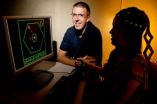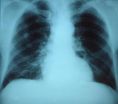(Press-News.org) CHAMPAIGN, Ill. — Scientists report that they can predict who will improve most on an unfamiliar video game by looking at their brain waves.
They describe their findings in a paper in the journal Psychophysiology.
The researchers used electroencephalography (EEG) to peek at electrical activity in the brains of 39 study subjects before they trained on Space Fortress, a video game developed for cognitive research. The subjects whose brain waves oscillated most powerfully in the alpha spectrum (about 10 times per second, or 10 hertz) when measured at the front of the head tended to learn at a faster rate than those whose brain waves oscillated with less power, the researchers found. None of the subjects were daily video game players.
The EEG signal was a robust predictor of improvement on the game, said University of Illinois postdoctoral researcher and Beckman Fellow Kyle Mathewson, who led the research with psychology professors and Beckman Institute faculty members Monica Fabiani and Gabriele Gratton.
"By measuring your brain waves the very first time you play the game, we can predict how fast you'll learn over the next month," Mathewson said. The EEG results predicted about half of the difference in learning speeds between study subjects, he said.
The waves of electrical activity across the brain reflect the communication status of millions or billions neurons, Mathewson said.
"These oscillations are the language of the brain, and different oscillations represent different brain functions," he said.
The researchers also found that learning to play the game improved subjects' reaction time and working memory (the ability to hold a piece of information in mind just until it is needed), skills that translate to everyday life.
"We found that the people who had more alpha waves in response to certain aspects of the game ended up having the best improvement in reaction time and the best improvement in working memory," Mathewson said.
This project is a part of a larger collaborative effort to determine whether measures of brain activity or brain structure can predict one's ability to learn a new video game. One analysis, led by Beckman Institute director Art Kramer (an author on this study as well), found that the volume of specific structures in the brain could predict how well people would perform on Space Fortress. That study used magnetic resonance imaging (MRI) to measure the relative sizes of different brain structures.
But MRI is expensive and requires that subjects lie immobile inside a giant magnet, Mathewson said. With EEG, researchers can track brain activity fairly inexpensively while subjects are engaged in a task in a less constricted, less artificial environment, he said.
The new findings offer tantalizing clues to the mental states that appear to enhance one's ability to perform complex tasks, Mathewson said. Alpha waves are associated with relaxation, but they also are believed to arise when one is actively inhibiting certain cognitive functions in favor of others, he said. It is possible that everyone could benefit from interventions to increase the strength of their alpha waves in the front of the brain, a region associated with decision-making, attention and self-control.
"You can get people to increase their alpha brain waves by giving them some positive feedback," Mathewson said. "And so you could possibly boost this kind of activity before putting them in the game."
INFORMATION:
The study team included researchers now at the University of Texas at Dallas and Florida State University.
The U.S. Office of Naval Research, the Natural Science and Engineering Research Council of Canada, and the Beckman Institute supported this research.
Editor's notes: To reach Kyle Mathewson, call 217-244-5668; email
kmathew3@illinois.edu.
The paper, "Different Slopes for Different Folks: Alpha and Delta EEG
Power Predict Subsequent Video Game Learning Rate and Improvements
in Cognitive Control Tasks," is available online and from the U. of I.
News Bureau.
Brain waves reveal video game aptitude
2012-10-25
ELSE PRESS RELEASES FROM THIS DATE:
Results of the TRILOGY ACS Angiographic Cohort presented at TCT 2012
2012-10-25
MIAMI, FL – OCTOBER 24, 2012 – A study has found that the anti-clotting medication prasugrel reduced cardiovascular events among patients who present with an acute coronary syndrome and are managed medically after an angiogram is performed to determine coronary anatomy. Results of the TRILOGY ACS trial, Angiographic Cohort were presented today at the 24th annual Transcatheter Cardiovascular Therapeutics (TCT) scientific symposium. Sponsored by the Cardiovascular Research Foundation (CRF), TCT is the world's premier educational meeting specializing in interventional cardiovascular ...
Large-scale production of biofuels made from algae poses sustainability concerns
2012-10-25
WASHINGTON — Scaling up the production of biofuels made from algae to meet at least 5 percent -- approximately 39 billion liters -- of U.S. transportation fuel needs would place unsustainable demands on energy, water, and nutrients, says a new report from the National Research Council. However, these concerns are not a definitive barrier for future production, and innovations that would require research and development could help realize algal biofuels' full potential.
Biofuels derived from algae and cyanobacteria are possible alternatives to petroleum-based fuels and ...
A sense of control, even if illusory, eliminates emotion-driven distortions of time
2012-10-25
CHAMPAIGN, Ill. — We humans have a fairly erratic sense of time. We tend to misjudge the duration of events, particularly when they are emotional in nature. Disturbingly negative experiences, for example, seem to last much longer than they actually do. And highly positive experiences seem to pass more quickly than negative ones.
Researchers say they have found a way to lessen these emotion-driven time distortions. Having a sense of control over events reduces the influence of emotions on time perception, the researchers report. This is true even for highly reactive emotional ...
FFR-guided PCI shows cost-effectiveness when compared to medical therapy for stable CAD
2012-10-25
MIAMI, FL – OCTOBER 24, 2012 –A strategy of up-front percutaneous coronary intervention (PCI) for lesions confirmed to be obstructive by fractional flow reserve (FFR) was shown to be cost-effective in terms of quality-adjusted life years when compared to medical therapy alone. Results of the Cost-Effectiveness sub study of the FAME 2 trial were presented today at the 24th annual Transcatheter Cardiovascular Therapeutics (TCT) scientific symposium. Sponsored by the Cardiovascular Research Foundation (CRF), TCT is the world's premier educational meeting specializing in interventional ...
Study confirms benefits of transcatheter aortic valve replacement over 3 years
2012-10-25
MIAMI, FL – OCTOBER 24, 2012 – A study found that transcatheter aortic valve replacement (TAVR) yielded lower mortality rates after three years compared with medical therapy in patients deemed to be ineligible for conventional aortic valve surgery. Results of the PARTNER Cohort B trial were presented today at the 24th annual Transcatheter Cardiovascular Therapeutics (TCT) scientific symposium. Sponsored by the Cardiovascular Research Foundation (CRF), TCT is the world's premier educational meeting specializing in interventional cardiovascular medicine.
TAVR is the recommended ...
Results of the ISAR-LEFT MAIN 2 trial presented at TCT 2012
2012-10-25
MIAMI, FL – OCTOBER 24, 2012 – A study found that second-generation drug-eluting stents are safe and effective in the treatment of left main coronary artery lesions. Results of the ISAR-LEFT MAIN 2 trial were presented at the 24th annual Transcatheter Cardiovascular Therapeutics (TCT) scientific symposium. Sponsored by the Cardiovascular Research Foundation (CRF), TCT is the world's premier educational meeting specializing in interventional cardiovascular medicine.
Patients undergoing invasive treatment of unprotected left main coronary artery (uLMCA) lesions are often ...
Scientists target bacterial transfer of resistance genes
2012-10-25
CHAMPAIGN, Ill. — The bacterium Streptococcus pneumoniae – which can cause pneumonia, meningitis, bacteremia and sepsis – likes to share its antibiotic-defeating weaponry with its neighbors. Individual cells can pass resistance genes to one another through a process called horizontal gene transfer, or by "transformation," the uptake of DNA from the environment.
Now researchers report that they can interrupt the cascade of cellular events that allows S. pneumoniae to swap or suck up DNA. The new findings, reported in the journal PLoS ONE, advance the effort to develop ...
Research findings breathe new life into lung disease
2012-10-25
TORONTO, Oct. 24, 2012--It turns out the muscle cells on the outside of blood vessels have been wrongly accused for instigating lung disease. New research shows that while these muscle cells are responsible for constricting or dilating the blood vessels, they are not responsible for sensing the amount of oxygen that gets to the lungs. That message comes from the endothelial cells – special cells that line the blood vessels – along a "signalling pathway."
When a person is low on oxygen, blood vessels throughout the body expand to improve the delivery of this vital molecule ...
Is obesity irreversible? Timing is key in weight loss, U-M research shows
2012-10-25
ANN ARBOR, Mich. — Joint research between the University of Michigan and the Argentina-based National Council of Science and Technology (CONICET) has shed light on one of the most frustrating mysteries of weight loss – why the weight inevitably comes back.
A novel animal model showed that the longer mice remained overweight, the more "irreversible" obesity became, according to the new study that appeared online ahead of print Oct.24 in the Journal of Clinical Investigation.
Over time, the static, obese state of the mice reset the "normal," body weight set point to ...
Mesh-covered stent helps restoration of blood flow in heart attack patients undergoing PCI
2012-10-25
MIAMI, FL – OCTOBER 24, 2012 – A clinical trial found that the use of a next generation, micronet, mesh-covered stent demonstrated improved restoration of blood flow to heart tissue, compared to the use of either bare-metal or drug-eluting stents in heart attack patients undergoing angioplasty. Results of the MASTER trial were presented today at the 24th annual Transcatheter Cardiovascular Therapeutics (TCT) scientific symposium and will appear in the November 6th issue of the Journal of the American College of Cardiology. Sponsored by the Cardiovascular Research Foundation, ...



